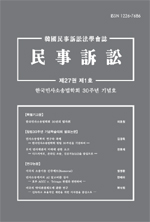Article 216 of Korean Civil Procedure Act, under the heading “Objective extent of Res Judicata,” states that ⑴ A final and conclusive judgment shall have the effect of res judicata in so far as the matters contained in the text thereof are concerned. ⑵ An adjudication on whether or not a claim alleging a set-off is constituted shall have the effect of res judicata only in respect of the amount pleaded to offset.” With regard to this provision, the precedents and theories are as follows: ⒜ In the interpretation of the provisions of Paragraph 1, the effect of Res Judicata only arises in the judgment order (the conclusion part), and ⒝ In the opposite interpretation of the provisions of Paragraph 1, it does not arise with regard to the reasoning of the judgment, but as an exception ⒞ In accordance with the provisions of Paragraph 2, If the defendant files a set-off defense, and the court rules on the existence of the offsetting claim, it arises within the limit of the amount countered by the set-off. In this paper, I have conducted research on the nature of the effect of Res Judicata and the issue of the objective extent of the effect of Res Judicata. In the theory of the nature of the effect of Res Judicata, I have shown that the theory of prohibition of contradiction is not only valid but also allows for a unified understanding of the effect of Res Judicata. In the theory of the objective extent of the effect of Res Judicata, I have argued that the occurrence of the effect of Res Judicata should also be recognized in the “judgment in the reasoning of the judgment,” and that the precedents and theories have already established the “preclusive effect” of the Res Judicata. In that process, I raised the need for reconsideration of the identity of the “effect of the judgment” on intervenor (the so-called participatory effect theory), and thoroughly examined the prohibition of contradiction theory, and presented my own solutions to some of the interpretive issues regarding the effect of Res Judica, which are constantly being discussed in precedents and academic theories.
Ⅰ. 緖論
Ⅱ. 旣判力의 意義, 本質
Ⅲ. 旣判力의 客觀的 範圍
Ⅳ. 遮斷效
Ⅴ. 判決理由 중 判斷의 旣判力
Ⅵ. 結論
(0)
(0)
